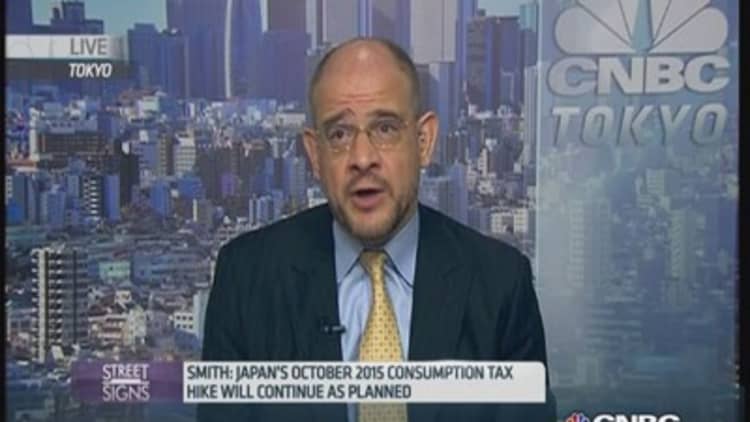Japan's Nikkei index has taken a rollercoaster ride so far this week, and some analysts believe traders should strap in for more turbulence.
"It's very difficult market to trade. You're trying to predict intraday moves instead of monthly moves," Ben Collett, head of Asian equities at Sunrise Brokers, said.
The index surged 4.0 percent on Monday, before dropping 2.0 percent Tuesday and recovering 2.6 percent Wednesday, moves which followed last week's 5.0 percent cumulative drop amid the global market rout. On Thursday, the Nikkei was down around 0.7 percent mid-session as markets around the region traded lower.
Read MoreJapanese exports grow at fastest pace in 7 months
"A lot of traders taken out by moves down are trying to hedge," by buying downside insurance, which tends to spur a market bounce, Collett said. "You still have people trying to buy on the dip and the short-term traders realize they're long-and-wrong and get out."
But while the Nikkei has recovered, Collett expects more volatility.
"Nobody seems willing to chase this [bounce]," he said, adding that while some are using the declines as an opportunity to bargain-hunt good fundamental stories, "everyone is waiting [for a bounce] to sell." Collett expects the Nikkei may rise another 150 points, but then he would consider shorting it, with the view that the index could eventually retest its year-to-date lows of around 13,900.

Some expect volatility could be here to stay.
"More volatility is likely given heightened uncertainty remains over the outlook," ANZ said in a note Wednesday. "Sentiment is more sensitive to bad news. Thus the more abrupt financial market moves are likely to be of a negative kind."
To be sure, many still get good vibes from Japan's market.
Read MoreWhy Japan's economy is stuck in 'no man's land'
Fund managers reported big increases in the weightings they give to Japan in their portfolios, Bank of America-Merrill Lynch said in its October global fund manager survey, released last week. A net 32 percent of fund managers were overweight on Japan stocks, marking a 10-month high, the survey found.
"The world had a flash crash. You can either panic about it or say back up the truck, they're having a discount sale at the local supermarket. I'm definitely suggesting back up the truck," Nicholas Smith, Japan strategist at CLSA, told CNBC.
With the country likely to boost its sales tax ahead, Smith expects authorities will pull out all the stops to counteract the effects on the economy, with additional monetary stimulus from the Bank of Japan, a government pension fund switch out of bonds into stocks and some fiscal stimulus all likely on tap.
Julius Baer is among the bulls, advising investors to buy the dip, tipping "bad news is good news" for the market.
Read MoreForget Japan's shrinking economy: property looks hot
"Japan is unique in Asia in having a stock market that correlates inversely with its currency. In other words, when the currency is weak, the stock market is strong," it said in a note Tuesday.
"It is difficult to see why the yen should strengthen," it added, citing poor economic data and the likelihood the Bank of Japan will extend its quantitative easing program. Julius Baer also noted that on the charts, the Nikkei is testing – and possibly breaking – a 19-year downtrend channel.
—By CNBC.Com's Leslie Shaffer; Follow her on Twitter @LeslieShaffer1

